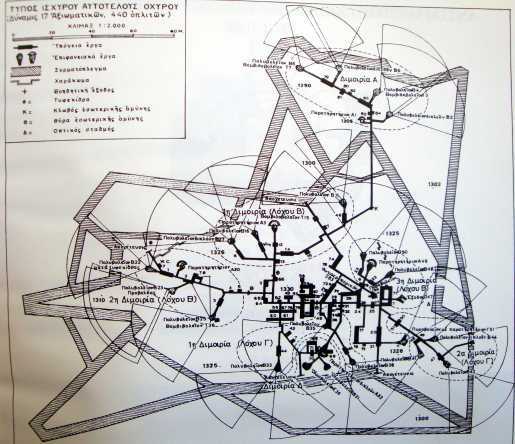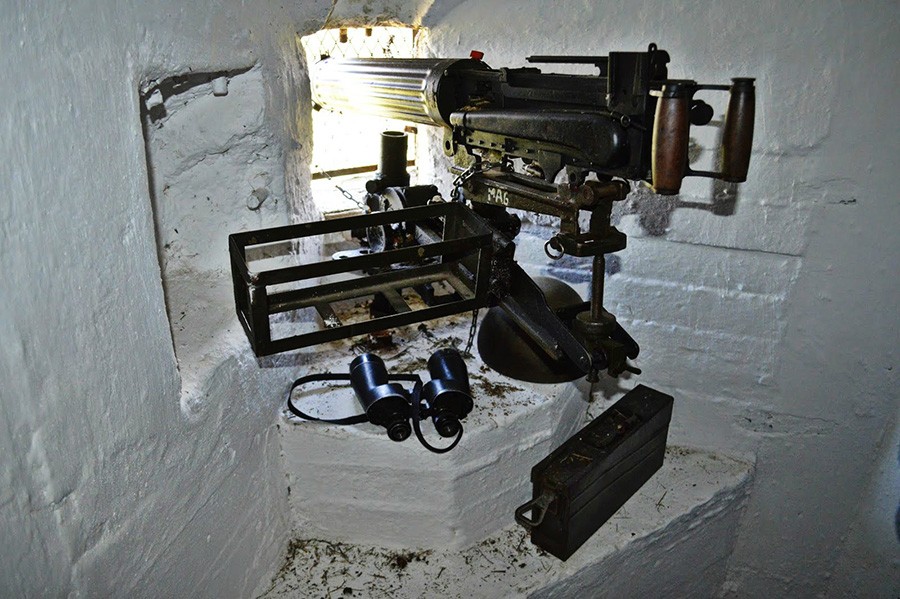The story
Exactly 76 years ago the “Battle of the Metaxas Line” begun. The “Metaxas Line” was the Greek equivalent of “Maginot Line” in France built by Ioannis Metaxas. It was a defensive line located in Northern Greece along the borders with Yugoslavia and Bulgaria. The Metaxas Line comprised of a total of 21 bunkers and among them the now legendary “Rupel Bunker” (Ρούπελ), all of them equipped with anti-tank poles, wires and everything that is necessary to stop an advancing force.
In April 6th 1941 the German troops attacked Greece from both the Yugoslavian and the Bulgarian borders. A series of amazing and heroic fights between the Greek soldiers and the Germans forces took place which lasted almost four days and nights. The Germans were surprised by the heroic Greek spirit and the disproportionate losses they had. Approximately much more than 800 were KIA -including a big part of the XVIII Mountain Corps- and more than 2500 were wounded, all in just under four days.

Picture : Map blueprint of Fort Rupel
It should be noted that the Metaxas Line did not break. Since the Metaxas Line was not finished when the war began, the German forces entered from a part of the front line not protected by the fortresses. Greece was forced to surrender and the fortresses were ordered to stop fighting as it was by then pointless. It was April 10th 1941.
The Germans, impressed as they were of the fighting abilities and valor of the Greeks, did something for the first and last time in all of World War II: they agreed on the terms imposed by those they had defeated. The Greek side demanded that,
1. No Greek was to be taken POW,
2. The Greek troops were going to leave the bunkers with their weapons and the officers with their swords and finally,
3. No German soldier was to enter the fortresses until the last Greek soldier had left and the Greek flag was lowered by the bunker’s garrison.
But the Germans did one more thing: when the Greek soldiers were coming out of the fortresses, an honorary contingent “presented arms” and the Greek commanding officers were asked to inspect the German contingent.
Even Adolf Hitler on his May 4th, 1941 speech at Reichstag said about the Greeks:
“Historical justice, however, obliges me to say that of the opponents that have taken up arms against us, most particularly the Greek soldiers, have fought with the greatest bravery and contempt of death. They only capitulated when further resistance became impossible and therefore useless.”
It was about the same time Winston Churchill stated that:
“Hence, we will not say that Greeks fight like heroes, but that heroes fight like Greeks”.

Picture : Inside of one of the machine gun bunkers of Metaxas Line
During the “Battle of the Metaxa Line”, many scenes of bravery took place. Probably the most notable and sad is the story of Sergeant Dimitrios Itsios. In the western side of the line, on the Greek mount “Beles” there were three fortified machine-gun nests, Π7, Π8 and Π9 (Π=Πολυβολείο=Machine-gun nest), with a handful of soldiers. Their position on the hill is called in Greek “Beautiful Hill” (Ομορφοπλαγιά).

Picture : Greek Army Sergeant Dimitrios Itsios
Sergeant Dimitrios Itsios
Sergeant Dimitrios Itsios was born at April 5th, 1906, at the village of Ano Porroia, Serres, Greece. He was a reserve non-commissioned Sergeant of the Greek army, during the German invasion in Greece, at April 1941. He was commanding a platoon of machine guns which were codenamed Π7 and Π8, and caused great casualties to the enemy.
The battle and his heroic -and unfair- death
It's 05:15 at dawn, when up on "Beautiful Hill" of Mount Beles, the most perfect war machine of the era starts its destructive work. The sun comes up accompanied by the sound of German artillery, mortars and machine guns. The attack starts, but the defenders of the first defense line reply with sustained machine gun fire.
Sergeant Itsios' and his comrades' eyes are red due to exhaustion, but they search the soil in front of them meter by meter. With their finger on the trigger, they are ready to defend their ground.
The sun is finally out. Suddenly, the sound of Stuka bombers can be heard. Three or four Stukas approach the area and start firing with their weapons, raining death everywhere. The attack was so fierce that the defenders can't stand it anymore. They have to retreat.
The machine gun nests are next. Their weapons don't stop firing. With will and soul made of iron, the Greek soldiers pin the Germans. Airplanes continue their vicious attacks, killing anything on their path. The forts resist. Their defenders spill their blood on the holy ground of their country.
The Greek machine gun nests Π3, Π4, Π5 and Π9 are gradually getting silenced. Next comes Π6, which gets encircled by the enemy, but after heavy resistance, gets conquered by noon.
Machine gun nests Π7 and Π8 continue their fight. Their operators are Greeks with soul, raised with the ideals of freedom and self sacrifice. Greeks who are not going to give even a square meter of land to the enemy. They know that they won't get out of this alive, but they don't care.
Machine gun nest Π8 has 38.000 rounds at its disposal, and the defenders don't care about ammo conservation. They are ready to use every single bullet they have!
At some point, Sergeant Itsios, seeing that the defense will go in vain, orders his soldiers to evaquate the nest and retreat along with the troops of the city of Rodopoli. He would stay back and cover their retreat, and try to kill as many Germans as possible. Some of them follow the order. But his fellow villagers from Ano Porroia disobey. Friends and brothers at work and festivals, now loyal comrades in Π8, ready to make the sacrifice.
"Drunk" from the smoke and the heavy smell of powder, and also in a state of pure ecstasy, he repels the rabid German attacks.
The helmets of the dead Wehrmacht soldiers shine under the April sun. The Germans continue their attacks, wave after wave they become more, they keep the pressure. But Sergeant Itsios doesn't stop spreading death and chaos with his machine gun. The longer he delays the Germans, the safer his comrades will retreat. He didn't even think about his own safety. Because he wasn't conquered by fear. His heart was beating for his brothers. He was fighting for all Greeks. One for all!
At some point, he runs out of ammo. Silence dominates the hill. Germans remain alerted. This is what they were waiting. The Greek Sergeant and his comrades know that they did their duty. They fought for their country, for their families, for their friends. They also know that they probably won't see them again.
They make it to open the heavy iron door of their nest. The empty shells had blocked it. They were finally out, in the mountain's air, filled with smoke, and the smell of powder and death.
It was late afternoon. They held the Germans for quite long. At their current state, half dizzy and sweaty from the weird silence, they didn't even realize that they had been encircled, unarmed, from a team of German soldiers.
The officer in charge, in fluent Greek orders the leader of machine gun nest Π8 to step forward.
The following moment, reminds them the Greek hero Athanasios Diakos, who had been captured the same way with Itsios. Proud of what he did, and with unbroken will and moral, without a single trace of bragging, Sergeant Itsios steps forward, salutes the German officer and with steady voice, replies :
-Dimitrios Itsios, Infantry Sergeant.
The other officer was stunned. Anyone could see in his eyes, his admiration for this man.
-Congratulations Sergeant. Thanks to your valor, you revived up here, on those mountains, the ancient history of your ancestors.
He then told him to follow. He guides him to the glade of the forest, in front of the nest, and while pointing to him the decades of dead soldiers -estimated to be more than 200- he tells to Itsios :
-This was your job Sergeant.
Itsios, calm like all real heroes, replied briefly :
-I did my duty.
-You did your duty. Now it's my turn to "execute" mine.
And in front of the surprised Greek and Germans soldiers, takes out his pistol, places it on his head and shoots him. It was the first cold blooded execution.
The brave Sergeant fell on the feet of his killer. A small amount of blood drowned the first wild flowers of "Beautiful Hill", marking the limits of valor, the love for ones country and the sacrifice, and cruelty, fasicm and inhumanity on the other hand. A cold blooded murder!
The German officer knew that he was committing a war crime, a stiff and outrageous murder, in front of the sad looks of his own soldiers, and the filled with bitterness and indignation looks of Itsios' comrades. Because their Sergeant wasn't killed in action. He was murdered. He left this world in an unfair way, a beautiful April day, in the midst of Spring...
Itsios' sacrifice has been recorded in a war report of the 111/70 Infantry regiment, in which it is also stated :
«…The brave officer Dimitrios Itsios, with his cruel death will enter the pantheon of heroes, and history will write his name as an example for the generations to come…»
His body, along with those of his comrades, were burried in "Beautiful Hill".
In 1946, his wife, Anna, along with other villagers, unburried and transported the soldiers' bones at a monument in Ano Porroia. It's the year that the Sergeant will receive the rank of Sergeant Major and the Silver Cross of Prowess, for his bravery and his courage.
Many years later, a monument is established on "Beautiful Hill", and close to the legendary nest Π8, a memorial, while the army camp which is located has been renamed to "Itsios Military Camp"
At August 10th, 1980, in an official ceremony, the statue of Dimitrios Itsios is revealed, in the square of the village of Ano Porroia.





 when I was in the Greek army we visited the Metaxa line.
when I was in the Greek army we visited the Metaxa line.









 cblanco ★
cblanco ★  보드카 중대
보드카 중대  VonManteuffel
VonManteuffel  Heartless Jäger
Heartless Jäger 